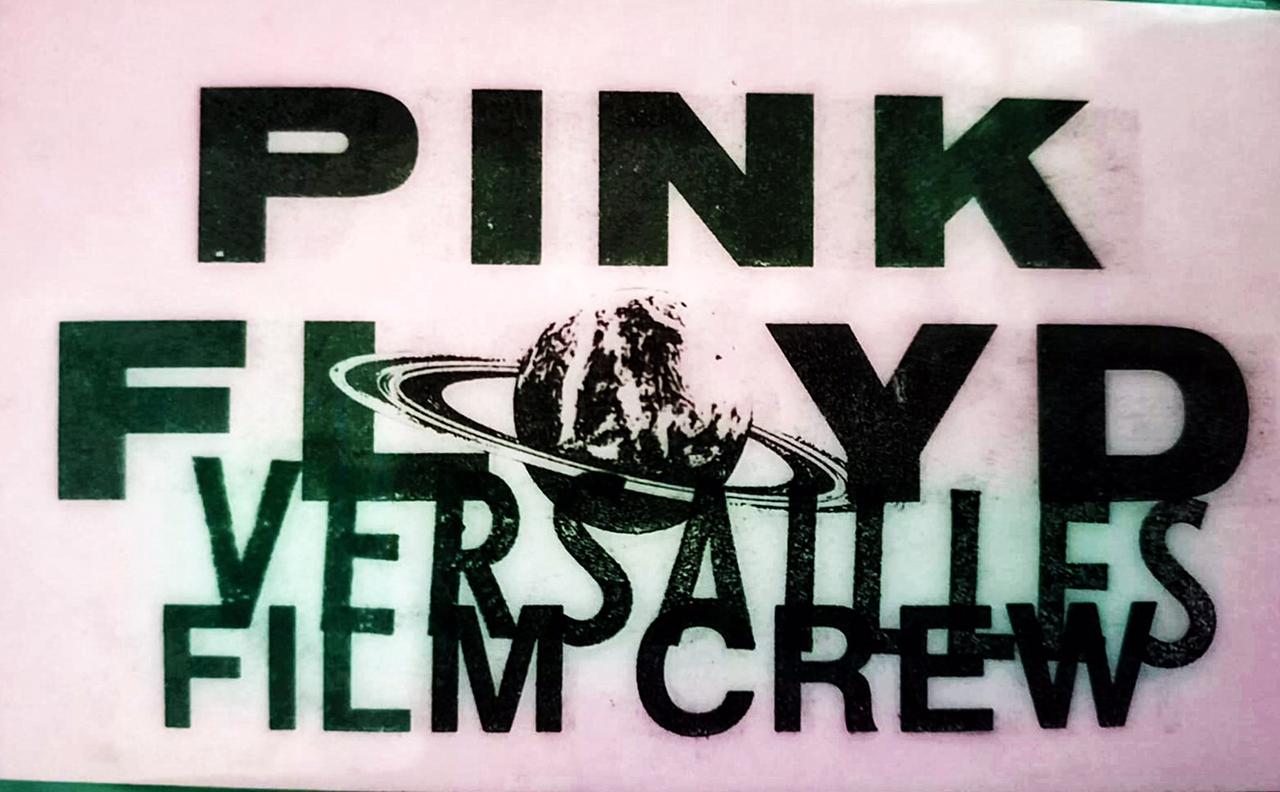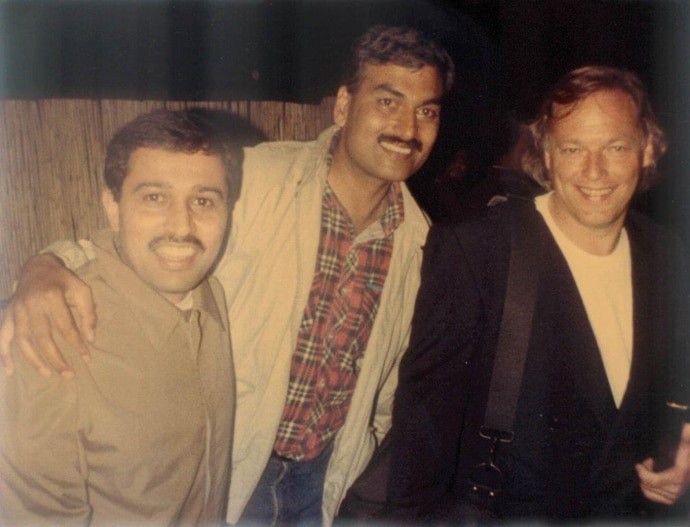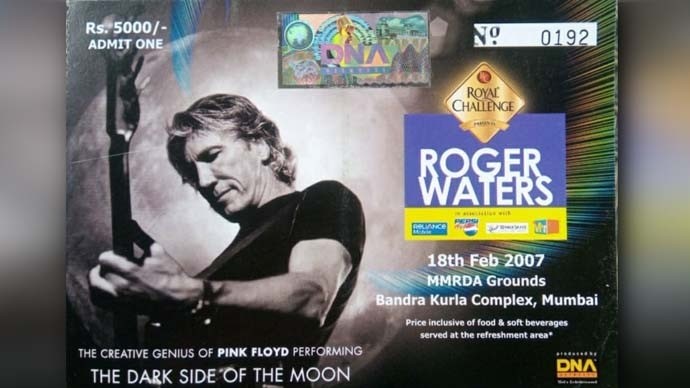June 22, 1988. Palais de Versailles, near Paris. We had grossly miscalculated our optimum arrival time.
We thought reaching three hours prior to the concert would be adequate to give us a vantage position in the forecourt of the Palais where the concert was being held. The massive arena was already packed. And people kept streaming in. A quick decision was necessary.
We had paid through our nose for the prized ticket on a frugal government scholarship (we were pursuing a one-year course in IIAP, Paris). We deserved a ring-side view of the proceedings. We weren’t there to watch the stage from a mile away or look at the goings-on on the giant screens sprinkled all over the vast ground. We wanted to see the action up close, see the expressions of the musicians and have an intimate connect with the band.
We were there to watch Pink Floyd, or rather three-fourths of it. Roger Waters had already left the band (we would see his show many years later). This was the band which was our abiding companion in college and after.
It was the one which told money to get away, get a good job with more pay and it would be okay.
It made us wonder which of the buggers to blame and to watch the pigs on the wing.
It asked us whether we thought we could tell heaven from hell, blue skies from pain.
It solicitously enquired of us when we were out there in the cold, getting lonely, getting old, whether we could feel it.
Something clearly needed to be done. We came out, walked the road to reach the service entrance at the rear meant for the musicians, crew, security, and other personnel.
To our immense good fortune, we met the film director who was to shoot the concert and requested him to help us enter the ground from the service entrance. He was shocked to see two Indians attending a Pink Floyd concert, and more so at the bizarre request.

He agreed provided we could pass the Pink Floyd music test he would conduct. He cycled back to his hotel, while we jogged along. He went up to his room to change while we waited in the lobby. He then conducted a half-hour test which we aced. Ceremoniously, he handed over the Film Crew badges to us, and on reaching the venue, conducted us inside through the rear entrance and planted us in the front row, bang in the middle. This was the best view which no amount of money could buy.
The concert started soon thereafter. The stage went dark. Rick Wright started playing the keyboards creating the dense, ethereal effect.
The crowd recognized the introduction instantly and went into raptures.
David Gilmour then waded in with his distinctive guitaring, Nick Mason followed on the drums, and after the most mind-blowing prelude, the vocals by Gilmour began:
“Remember when you were young,
You shone like the sun,
Shine on you crazy diamond.”
One lakh throats screamed in approval. The show was underway.

Pink Floyd, a progressive band, made the "progressive" genre mainstream. The top-drawer albums they created made them the leader of the "progressive" pack. They changed the future of music by granting authenticity and integrity to the genre. They were celebrated for their inimitable blend of complexity and precision.
Their first album The Piper at the Gates of Dawn (1967) showed their potential for pop whimsy and surrealism. However, after this album their principal songwriter Syd Barrett suffered a drug-induced breakdown (the opening song mentioned above was a tribute to Barrett).
David Gilmour was recruited in his place. Then came A Saucerful of Secrets (1968), More (1969), Ummagumma (1969), Atom Heart Mother (1970), Meddle (1971) and Obscured by Clouds (1972).
Waters gradually became the chief lyricist and Gilmour became the main vocalist. During this phase, Gilmour’s guitar and vocal contributions were making him into a major musical force within the group, forging an increasingly melodic and out worldly sound.
Waters, as a lyricist produced a formidable body of work. Very few songwriters have composed more sensitive statements concerning the human condition.
The Dark Side of the Moon (1973) was the breakthrough album which elevated the status of the genre to an art form. It did to progressive rock what Sgt. Pepper’s Lonely Hearts Club Band (1967) did to rock 'n' roll. It was the band’s first concept album. The iconic prism spectrum album art cover, the theme concerning the loss of a creative person’s ability to function in the modern world, its textual and conceptual richness made it one of the greatest albums of all times, and one of the largest selling.
Beginning with The Dark Side of the Moon and stretching through Wish You Were Here (1975) and Animals (1977) to The Wall (1979), Pink Floyd exemplified progressive rock while transcending it.
When Waters left after The Final Cut (1983), Gilmour assumed command of the group. Three albums were released — A Momentary Lapse of Reason (1987), The Division Bell (1994), and The Endless River (2014). He also did solo work.
We were coming to the end of the concert. As the opening strains of ‘Comfortably Numb’ were heard, the crowd went delirious. No concert was complete without this song.
“I can't explain you would not understand/
This is not how I am/
I have become comfortably numb”
The two guitar solos — one in the middle, one at the end have been rated as one of the best guitar solos ever.
Gilmour didn’t disappoint and his guitar work cut through the evening like laser through fog. He had the crowd ecstatic.
After the show, we went to the hospitality tent at the back (we are members of the film crew, remember) for drinks and dinner.

The writer (extreme left) with Dave Gilmour (extreme right)
After we had finished, we met David Gilmour, the man himself. What an end to a glorious evening!
As I mentioned above, I only saw 75 percent of the band. The original band members on stage were only three — Dave Gilmour, Nick Mason, and Richard Wright. The fourth member, Roger Waters — the bassist — was absent. He had left the band three years earlier under unpleasant circumstances. But if you consider his contribution to the band, then I saw much less than half the band. Many songs sung that day were his. The band just could not do without his songs.
I would finally see the missing piece in 2007 at his solo concert. And reconfirm that the man was indeed the embodiment of the band.
“Time is linear / Memory is a stranger / History is for fools / Man is a tool in the hands / Of the great God Almighty / And they gave him command / Of a nuclear submarine / And sent him back in search of / The Garden of Eden.”
Such imagery, while critiquing our mindless obsession with media, could only have been the handiwork of one man.
The ageless war dog is defined by his decades-spanning collection of concept albums that dive headlong into hot-button social and political issues that include capitalist greed, as portrayed in Animals, youthful alienation in The Wall, and the futility of war in Amused to Death (1992).
Before delving any deeper, first here is the background for the uninitiated.
Waters did not start playing music until he was almost 20. His childhood was haunted by the departure of his father to World War II to join the British Army. He died in combat when Waters was five months old. In 1965, he co-founded Pink Floyd. Waters initially served solely as the bassist but following the departure of singer-songwriter Syd Barrett in 1968, he also became their lyricist, co-lead vocalist, and conceptual leader.
Waters asserted a heavy degree of creative control for the album The Dark Side of the Moon, penning all the lyrics, creating the concept, and receiving music writing credits on all but three of the songs. The Dark Side of the Moon turned out to be the pivotal album in Pink Floyd's career, an instant hit that turned into an enduring blockbuster. Two years later, the band delivered Wish You Were Here — a concept loosely based on the departed Barrett. The dystopian Animals followed. During the supporting tour for Animals, Waters felt himself retreating from his audience, and he used this as an inspiration for writing the semi-autobiographical rock opera The Wall. The 1979 double album was a smash hit. By this point, Waters was the band's leader and he shepherded them through The Final Cut, that was billed as "A requiem for the post-war dream by Roger Waters, performed by Pink Floyd." This subtitle suggested complete control of the band by Waters which inevitably lead to ill will leading to Waters leaving the band.
In 1984 came his solo album The Pros & Cons of Hitchhiking. Waters officially left the band in 1985, filing a lawsuit to dissolve it the following year. His claim was rejected. Gilmour, Mason, and Wright continued as Pink Floyd, while Waters continued his solo career.
In 1987 he released the ambitious concept album Radio KAOS. Once the Berlin Wall fell in November 1989, Waters decided to revive The Wall as an all-star tribute concert in Berlin in July 1990. Two years later he released his Amused to Death — an antiwar concept album.
He released two antiwar songs on the Internet in 2004 — To Kill the Child and Leaving Beirut. A reunion with Pink Floyd followed in 2005, with the group appearing at the Live 8 benefit at Hyde Park. Greeted by rave reviews, the band nevertheless did not capitalize on it, choosing to stay separated. Waters released his opera Ca Ira in 2005, and then beginning in 2006 he spent two years touring The Dark Side of the Moon. He next recorded Is This the Life We Really Want? in 2017.
Even as a septuagenarian, Waters is a firebrand, imbuing his tour with politics and edginess. While many singers have used music as a medium to highlight injustice, Waters has taken activism to a whole new level. Nothing is off-limits. Sponsors have pulled the plug, governments have expressed outrage, the opposing side has protested, but it does not faze him one bit.
Consider this. In his album Is This The Life We Really Want? Waters turns his skeptical yet hopeful eye toward refugees and President Trump, among other topics. The album’s most biting songs, featuring ferocious lyrics, are also the highlight of his concert film, Roger Waters: Us + Them (2019), that earns its stripes by affirming the timelessness of Waters’ thematic concerns and proving that fresh material can be as good as the classics. Us and Them was a song in The Dark Side of the Moon. Replacing the “and” with a plus sign makes the point that if humanity is going to survive the only way forward is together. The concert film features characters that include Refugee, Drone Pilot and Palestinian Girl. Waters still cuts an authoritative yet hip figure, the coolest grandpa ever. His voice — cracked and battle-scarred warble — conveys authenticity and righteous fury. For a man championing peace, he sounds furious.
He is a loud voice on human rights issues. He has a particular interest in the Israeli-Palestinian conflict and has publicly condemned other artists like Madonna for performing in Israel. He is also involved with other causes including malaria eradication, poverty alleviation, and the fight against climate change.
Waters even did not spare events in India. He protested the citizenship law (CAA) at an event in London, where he also recited from the poem of a Delhi poet-activist Aamir Aziz. The event was held to demand the release of Julian Assange.
I watched Waters’ The Dark Side of the Moon concert in Mumbai on February 18, 2007. It was a delightful and emotionally charged show. The crowd knew the words to most of the songs that clearly moved Waters and he made a mention of it at the end of the show. There were many Pink Floyd songs interspersed with his solo repertoire. And of course, the full The Dark Side of the Moon album. The show ended with the eternal crowd-pleaser (by that time the crowd was at its ecstatic apogee on music, smuggled drinks, and other stimulants) – Comfortably Numb. The theatrics were all there – including the prism colors of Dark Side. For good measure, the incorrigible Waters also had a floating pig sporting ‘Kafka Rules’, ‘Get Rid of the Caste System’ and ‘Sab Jaati Ek Hain’. When the pig was let loose to float away, ‘Free at Last’ could be read emblazoned on its belly.

Roger Waters is yet to hang his boots. He is sometimes aggravating and occasionally troublemaking. “Hanging on in quiet desperation is the English way,” is a line from the Pink Floyd classic Time. It is not Roger Waters’ way.
A very interesting development took place after my experience at the Paris concert came into the public domain. ‘Pulse & Spirit – Pink Floyd Fanbasis’ – a German Pink Floyd fan site, came out with a piece describing the experience. It ended with – “What a great story! A photo taken backstage after the show with David Gilmour proves that the story is true!”
 Ajay Mankotia pursued BA in Economics (Honours) from St. Stephen’s College, Delhi University followed by a Master’s Degree in Economics from the Delhi School of Economics, Delhi University. He also has a Diplôme D’études Superiéures Spécialisées in International Economic Relations from the University of Paris-XI, Paris, and Master’s Degree in Law (LLM) from Law Centre, Delhi University. Ajay, who joined the Indian Revenue Service in 1982, has worked at a wide variety of posts in the Indian Government, including Chief Vigilance Officer of some public sector fertiliser companies. He retired as Commissioner of Income Tax with Voluntary Retirement in 2008 after having spent twenty-six years as a taxman and joined a media company as President (Corporate Planning and Operations). He presently runs his own Tax and Legal Advisory. With his vast areas of interests, Ajay regularly writes articles on tax, vigilance, music, films, sports, defense and other topics of interest in newspapers and online news portals. He is married to Atima Mankotia and has a daughter and a son.
Ajay Mankotia pursued BA in Economics (Honours) from St. Stephen’s College, Delhi University followed by a Master’s Degree in Economics from the Delhi School of Economics, Delhi University. He also has a Diplôme D’études Superiéures Spécialisées in International Economic Relations from the University of Paris-XI, Paris, and Master’s Degree in Law (LLM) from Law Centre, Delhi University. Ajay, who joined the Indian Revenue Service in 1982, has worked at a wide variety of posts in the Indian Government, including Chief Vigilance Officer of some public sector fertiliser companies. He retired as Commissioner of Income Tax with Voluntary Retirement in 2008 after having spent twenty-six years as a taxman and joined a media company as President (Corporate Planning and Operations). He presently runs his own Tax and Legal Advisory. With his vast areas of interests, Ajay regularly writes articles on tax, vigilance, music, films, sports, defense and other topics of interest in newspapers and online news portals. He is married to Atima Mankotia and has a daughter and a son.
Buy his book, There's Seven For You, Three For Me: Chronicles of a Taxman from Amazon.


Comments